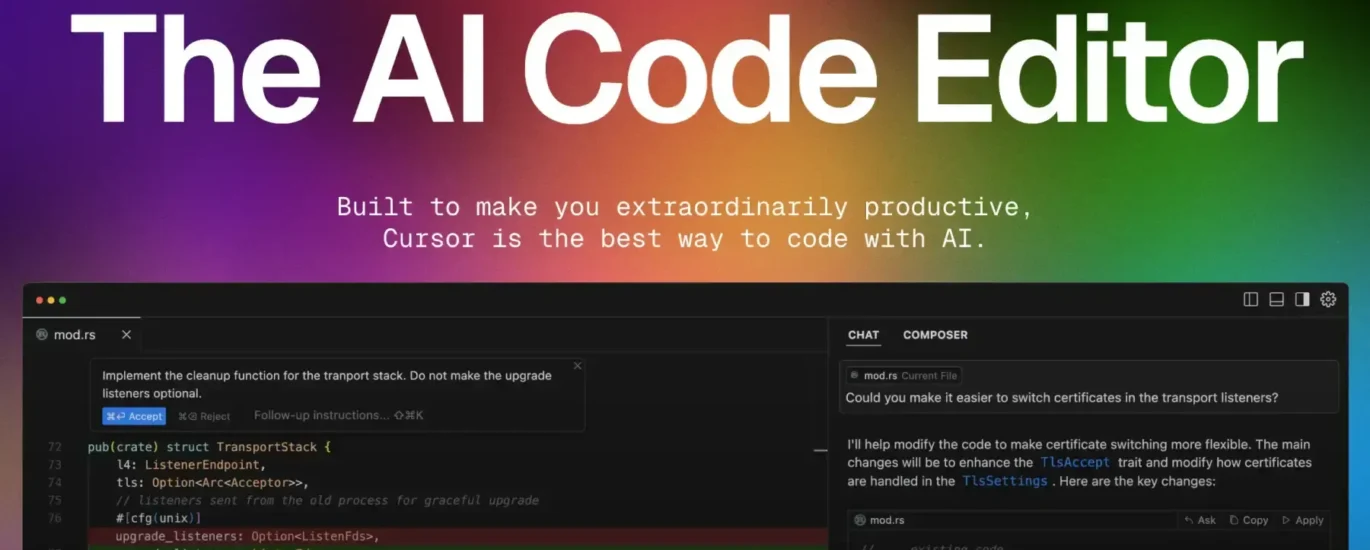Artificial intelligence is reshaping the way developers write, debug, and ship code. Cursor AI, developed by Anysphere, has quickly become one of the most talked-about tools in this space. From major product updates to cultural quirks at its headquarters, Cursor continues to push the boundaries of what’s possible with AI-driven coding. Here’s a roundup of the latest updates you need to know.
1. Major Product Updates – Cursor 1.4 & 1.5
Cursor has rolled out significant improvements across its latest versions:
- Version 1.5 (August 21, 2025):
- Seamless Linear integration to run background agents directly from issue trackers.
- Improved agent terminal flow, making reviews smoother with visual focus shifts.
- Native OS notifications to keep developers updated in real time.
- MCP elicitation support with JSON Schema validation.
- Notebook upgrades: smarter tab awareness, better cell copying, and GPT‑5 with to-do creation.
- UI performance fixes via minor patches (1.5.1–1.5.5).
- Version 1.4 (August 6, 2025):
- Enhanced agent steerability, letting users queue or interrupt messages.
- Smarter tools for navigating large codebases (file reads, search, grep, web search).
- Ability to assign different models per agent with preserved settings.
- Transparent usage insights and pricing in chat for teams.
- A compact chat mode and unified sidebar for agent tracking.
2. Bugbot: AI-Powered Code Review
Cursor recently launched Bugbot, a GitHub-integrated tool that reviews pull requests. It identifies logic errors, edge cases, and security risks before they reach production. After successful beta testing, Bugbot is now publicly available for $40/month per seat. It’s designed to help developers catch issues that AI-powered “vibe coding” might miss.
3. Security Patch: Prompt-Injection Fix
In July 2025, a serious vulnerability (CVE‑2025‑54135) was discovered in Cursor’s MCP server handling. The flaw allowed remote code execution via malicious MCP entries (e.g., Slack). Cursor addressed this in version 1.3 by replacing the old global “denylist” with a safer allowlist approach, strengthening overall security.
4. Pricing Model Overhaul
Cursor’s Pro plan pricing changed in mid‑2025 from a flat 500 fast responses/month to a $20/month credit-based system. This sparked user backlash due to unexpected charges and unclear limits. The company later issued refunds and clarified usage-based pricing, aligning with broader industry challenges around compute costs driven by so-called “inference whales.”
5. Business Growth & Vision
Cursor’s parent company, Anysphere, has grown rapidly:
- Closed a $900M Series C, valuing the company at $9.9B.
- Surpassed $500M in ARR by mid‑2025.
- Expanded to around 150 employees, while maintaining a lean and focused strategy.
CEO Michael Truell envisions a future where software development requires minimal human intent, with AI agents handling most of the heavy lifting. This reflects the rise of agentic workflows and the concept of “vibe coding.”
6. Culture & Industry Trends
Cursor has attracted attention not just for its products, but also for its culture:
- Its no-shoes office policy at its San Francisco HQ sparked debate in startup circles.
- The rise of vibe coding—where developers guide AI to write code with natural language—has been both celebrated for speed and critiqued for reliability.
Summary Table
| Category | Highlights |
|---|---|
| Product Releases | Cursor 1.4 & 1.5 with major agent, UI, and integration improvements |
| Debugging | Bugbot launched for AI-powered pull request reviews |
| Security | Prompt-injection vulnerability patched with safer MCP handling |
| Pricing | Pro plan shifted to usage-based; refunds issued after backlash |
| Funding & Valuation | $900M Series C → $9.9B valuation; $500M ARR |
| Vision & Culture | Focus on AI agent workflows; casual office culture with no-shoes policy |
| Industry Context | “Vibe coding” trend rising; challenges from compute costs |







